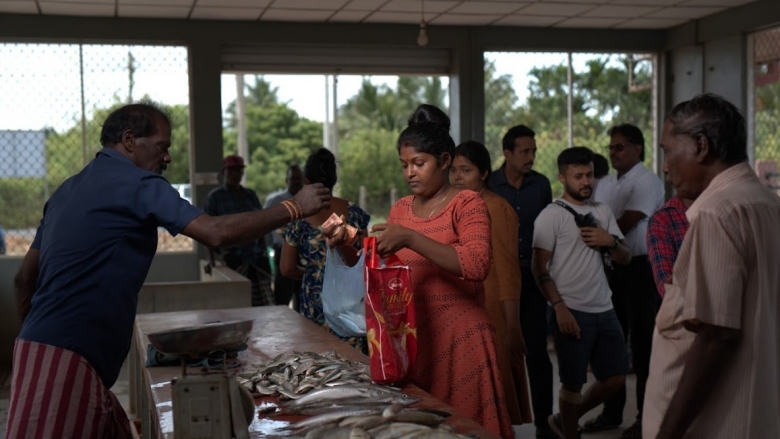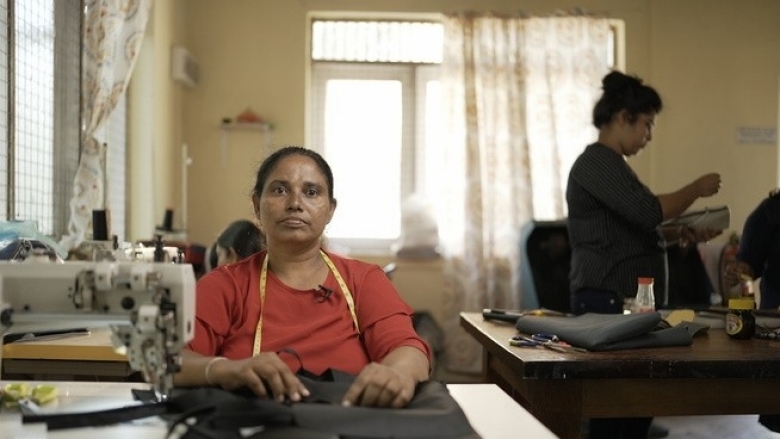Synopsis
Urbanization, when well-planned and managed, can be a powerful sustainable development tool and a catalyst for job creation. However, an increasing urban population presents challenges related to inclusion, sustainability, and service provision. Cities continue to be the world’s primary growth engine, contributing over 80 percent of global GDP and helping to lift hundreds of millions of people out of extreme poverty.
Sri Lanka’s Local Development Support Project (LDSP) is empowering local authorities to generate jobs, enhance services, and improve citizens' quality of life. India’s Uttar Pradesh Pro-Poor Tourism Project (UPPTP) is helping to innovate pro-poor and sustainable tourism in key cities to unlock the growth potential of heritage assets and local artisans. These two projects are fostering more livable, sustainable, and inclusive cities and communities in South Asia. Underdevelopment in lagging regions limits both livelihoods and livability. Investing in better services and economic opportunities doesn’t just uplift communities, but it also facilitates balanced growth for the entire nation.
Local Development Support Project (LDSP)
“Previously we only received water once in 2 days and we had to travel long distances to obtain water…Now we get piped water 24 hours a day.”—S. D. Swarnalatha, beneficiary, LDSP-funded Katupathwewa water supply project, Nochchiyagama Pradeshiya Sabha, Anuradhapura District.
“Thanks to this business, I am now in a much better financial position. I have three employees, I can pay the rent on time, and I manage everything much more effectively than I did when I was abroad. It has been a great experience.”—Food shop owner, Kattankudy container shops.
Uttar Pradesh Pro-Poor Tourism Development Project (UPPTDP)
“I save now about INR 6,000 per month (approx. USD $72.00). I am doing it to expand my business and give a head start to my children in life so then they can have the knowledge and skills to be who they chose to be, not what society thinks they should be.”—Farzana, Zardozi embroidery artist, Muzaira Self-Help Group.
“Despite the societal restrictions imposed on women, with the project[’s] help, I decided to start my own carpet making, and formed the Ayan Self-Help Group in July 2019. I started making carpets for a daily wage. Then, after participating in a training in the group, I improved my weaving skills and started receiving orders from outside Taj Ganj. I am now earning about INR 6,000-8,000 per month (approx. USD $72–96) and am planning to increase it after I learn new techniques!”—Sabreen, carpet artist, Ayan Self-Help Group.
Photo Credit: The World Bank
Challenge
Over the next 20 years, the urban population in developing countries will double to 4 billion, while the urbanized land area will triple. While rapid growth creates new opportunities, it also brings serious social, economic, and environmental challenges. Building inclusive, resilient, competitive, and sustainable cities and communities is essential for achieving poverty reduction, shared prosperity, on a livable plant through jobs.
Sri Lanka, has been plagued by multiple crises, including a civil war that ended in 2009 and economic collapse following the COVID-19 pandemic. These events have eroded development gains and affected citizen morale, with increases in poverty and job and food insecurity, especially in the Northern, Eastern, Uva, and North Central Provinces. These provinces account for one-third of the nation's poor. Local authorities possess limited capacity and funding to meet the needs of their constituents and unlock assets for prosperity.
In 2016, India's state of Uttar Pradesh faced a similar situation, with communities unable to reap the benefits of tourism despite the state being one of India's biggest cultural, religious, and tourist destinations. While Uttar Pradesh is home to world-renowned monuments and places such as the Taj Mahal in Agra and the ancient city of Varanasi on the banks of the Ganges, and venerated sites associated with figures including the Buddha and Krishna, people living near these major attractions continue to face persistent poverty. Even as 6.5 million tourists visited the Taj Mahal annually, nearly half of Agra's population lived in slums. Tourism was not perceived as a key driver of socio-economic prosperity; instead, policy focus was on beautifying specific sites for presentation to foreign visitors, with minimal community dialogue and support taking place.
Both countries' challenges were to determine how to build community, foster inclusive development gains, and empower local and state authorities with the knowledge needed to ensure long-term economic growth and prosperity.
Approach
Cities and communities thrive when planning systems and local capacities are enhanced with the right support. When cities and local authorities invest in marginalized communities during the development process, everyone benefits. The World Bank’s efforts in urban development focus on creating sustainable communities and cities through green, inclusive, and resilient practices. This work contributes to Sustainable Development Goal (SDG) No.11 and the New Urban Agenda.
The Local Development Support Project in Sri Lanka began in 2019 with the goal of empowering 134 local authorities in four of the nation’s poorest provinces to deliver community services. The World Bank provided financing together with expert guidance and trainings that strengthened the capacity of local authorities to deliver community services.
LDSP provided block grants to municipal and urban councils and Pradeshiya Sabhas (municipal legislating bodies) to invest in basic and social welfare services, along with local economic development and capacity improvement efforts. Targeted investments included water supply and improved drainage and sanitation; rural roads to connect communities; libraries and community spaces as hubs for cultural preservation and social inclusion; public parks; and daycare and early education facilities. In addition, LDSP allocated performance-based funds to each local authority, with annual funding based on progress in fostering sustainable growth and meet community needs. Each of the 2,000 subprojects under LDSP was chosen using a participatory approach. Local authorities collaborated with communities to develop plans for investments in priority needs.
The Uttar Pradesh Pro-Poor Tourism Development project was launched in 2018 as the first tourism project financed by the World Bank in India, adopting a comprehensive pro-poor approach that aimed to benefit local poor people, especially craftspeople and women, while unlocking a major economic driver for the state. The project mapped cultural and natural assets in the state’s main destinations, along with their visitor flows, spending patterns, and economic potential. Based on these findings, the project adopted a three-pronged pro-poor tourism approach, which includes developing destinations as a whole rather than isolated sites, maximizing tourism benefits to local communities, and enhancing the experience of the domestic market through investments in services and products tailored to their needs.

Photo Credit: The World Bank
Results
The two projects have had a transformative impact on the urban areas and provinces targeted.
The LDSP has implemented over 2,000 sub-projects across 134 local authorities in the four participating provinces, benefiting more than 1 million people, including more than 600,000 women.
- The project facilitated the construction of 70 kilometers (km) of local roads, linking communities to schools, hospitals, and employment opportunities. It established eight km of local drainage systems and supported 100 small-scale local solid waste management sub-projects, benefiting 7,300 households in underserved areas through water supply schemes.
- The project established 30 daycare centers and preschools and constructed or rehabilitated 34 health centers. Seventy public parks provide community spaces for social interaction, while 132 sub-projects supply equipment, books, and buildings to libraries.
- The project created 2,000 new jobs for women-headed households, youth, and disadvantaged individuals and established 200 public markets that connected vendors and entrepreneurs with citizens
- The project’s targeted training programs and performance-based funding component improved the capacity of local authorities: 49 percent of local authorities met their revenue goals in 2023 compared to 38 percent in 2022. Furthermore, the number of local authorities utilizing ICT tools for revenue collection (e.g., online payments) rose from 37 percent in 2022 to 63 percent in 2023.
The Uttar Pradesh Pro-Poor Tourism Development Project benefited almost 16,000 individuals (7,476 of whom were women) through inner city rehabilitation planning and investments that enhanced basic services and infrastructure, including water supply, solid waste facilities, road and drainage systems, and sewer connections. It also regenerated green spaces, created green walkways, street vending zones, and signage around major tourist areas. These improved services not only benefited local communities but also made urban areas more tourist friendly. The enhanced livability of the targeted areas led to an increase in domestic tourists’ average spending and length of stay.
The government of Uttar Pradesh in turn adopted this successful pro-poor approach in its new Tourism Policy 2024 and launched a $340 million initiative for new tourism projects across the state in March 2024.
The project’s extensive business development support has reached over 7,000 poor people and artisans, turning them into entrepreneurs with adequate tools, infrastructure and market linkages. This initiative has contributed to the creation of 2,861 jobs within the tourism value chain—most of which for poor women who have been elevated into entrepreneurs and are breaking poverty cycles by employing other poor women. This initiative led to the economic independence of craftspeople, comprising a total of 5,725 individuals—of whom 4,369 were women—organized into 561 Self Help Groups, and craftspeople to directly secure larger orders from other states and some internationally.
The LDSP was funded by a credit of $50 million from the International Development Association (IDA), as well as European Union grant funding of Euro 20 million. The UP Pro-Poor Tourism Development Project was financed by a $35 million IBRD loan.

Photo Credit: The World Bank
Partnerships
The EU funding for LDSP was instrumental in facilitating performance transfers and providing support for capacity building for the local government authorities. The project also established partnerships with UNDP and Asia Foundation to enhance the capacity of local authorities.
As the first tourism development project financed by the World Bank in India and the first to adopt a comprehensive pro-poor approach, the Uttar Pradesh Pro-Poor Tourism Development Project's design was peer-reviewed by key global partners, including UNESCO and the World Tourism Organization. It also benefited from the experience and support of several local organizations, such as INTACH.
Looking Ahead
LDSP has propelled a virtuous cycle that has facilitated institutionalization of its participatory approach. It also contributed to streamlining the national performance assessment system. The performance-based funding is now adopted by the government of Sri Lanka as a tool to build capacity and deliver on local development. A cabinet decision was issued on December 23, 2024, announcing a program to support 54 local authorities in Sri Lanka by providing performance-based funding.
The Uttar Pradesh Pro-Poor Tourism Development Project demonstrated how tourism can drive prosperity by shifting action to support local communities and the tourism domestic market. The pro-poor model was adopted by the state of Uttar Pradesh through a series of new investments state-wide as well as globally as the main strategy for re-opening destinations worldwide impacted by COVID-19 pandemic.

